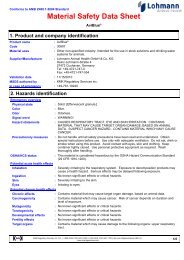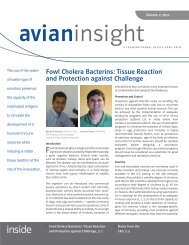Product Information Sheet - Lohmann Animal Health
Product Information Sheet - Lohmann Animal Health
Product Information Sheet - Lohmann Animal Health
Create successful ePaper yourself
Turn your PDF publications into a flip-book with our unique Google optimized e-Paper software.
Infectious Bursal Disease<br />
From an economic point of view, Infectious Bursal Disease (IBD), also<br />
known as Gumboro Disease, is one of the most important poultry diseases<br />
worldwide. It is a highly contagious viral disease, affecting the immune<br />
system of chickens. Young chickens up to 6 weeks of age are most<br />
susceptible to the virus, depending on their level of maternal immunity<br />
against the disease. The IBD virus targets and destroys the B cells in the<br />
bursa of Fabricius which is a central organ for the immune response in<br />
the young chicken. Infections by classic strains initially result in swelling<br />
of the bursa, followed by atrophy. On the other hand, variant strains usually<br />
cause bursal atrophy in the absence of inflammation.<br />
The immune status of the flock to be vaccinated should be determined<br />
prior to using this vaccine. Vaccination programs should address the<br />
breed of bird, the parent vaccination program utilized and the history<br />
of IBD in each operation/facility. Ask your representative of <strong>Lohmann</strong><br />
<strong>Animal</strong> <strong>Health</strong> Technical Support for more information.<br />
Live IBDV vaccine rotation<br />
Broiler producers customarily change the vaccination programs according<br />
to seasonal variation in the level of field challenge. Live IBDV vaccines<br />
are classified according to their virulence from mild to intermediate plus<br />
or hot. Since each vaccine type is able to break through different levels of<br />
maternal antibodies, it is essential to know when such levels will be low<br />
enough to allow the vaccine virus to infect the bursa, replicate and generate<br />
a protective immunity. Poultry flocks are usually formed by chickens<br />
from different breeder flocks, exhibiting a great variation in the levels<br />
of maternal antibodies at day of age. Under those circumstances, live<br />
intermediate, non-cloned vaccines are an excellent choice due to their<br />
broad antigenic diversity associated with the presence of different viral<br />
subpopulations, their ability to break high and variable levels of maternal<br />
antibodies, without causing immunosuppression and their capacity to<br />
generate a primary immune response before the administration of inactivated<br />
vaccines in breeders.<br />
– Non-cloned<br />
– High breakthrough titer<br />
– Improved performance<br />
Producers can make their choice from the range of live IBD vaccines from <strong>Lohmann</strong> <strong>Animal</strong> <strong>Health</strong><br />
(below). The products offered cover the whole spectrum of invasiveness, from mild strains to<br />
intermediate plus.<br />
Categorization of live IBD vaccines<br />
– Microscopic lesions<br />
of the Bursa<br />
– Works in the face of<br />
maternal antibodies<br />
Mild Intermediate Intermediate Plus<br />
– Serological response<br />
– Bursa to body<br />
weight ratio<br />
– Immunosuppression<br />
– Dose needed<br />
to immunize<br />
PF_MEN_CC010_LV:1478_010610<br />
Prevention first.<br />
AviPro® Vibursa CE – Live vaccine against Infectious Bursal Disease. For veterinary use only.<br />
Check with your poultry pathologist before vaccinating chickens suspected of having been<br />
recently exposed to Infectious Bursal Disease. Vaccination program: 1 dose at 10 days,<br />
for chicks with no detectable maternal antibodies at day-of-age; 2 doses for chicks with<br />
maternal antibodies: first at 10–14 days and second 2–3 weeks later. Prepare and administer<br />
the vaccine according to package insert recommendations. Store vaccine between 2–7 ºC<br />
(35-45 ºF). Withdrawal period: 21 days for the U.S. The vaccine is produced and controlled<br />
according to USDA recommendations and specifications.<br />
<strong>Lohmann</strong> <strong>Animal</strong> <strong>Health</strong> International<br />
375 China Road<br />
Winslow, Maine 04901, USA<br />
Phone: (+1) 207-873 3989<br />
www.lahinternational.com
















